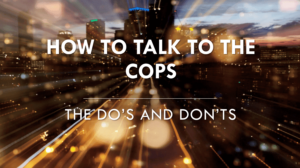 CONTACT OUR TEXAS DWI LAWYER!
Typically, if an officer is asking to look through your vehicle, it means that they have no justification to initiate the search. By giving consent, you waive your Fourth Amendment protections, and anything the officer finds may be used against you in your case.
Difficult as it may be, politely declining a vehicle search is in your best interest, even if you feel you have nothing to hide. You don’t want to unknowingly allow the officer to collect evidence that can strengthen the prosecutor’s allegations. If you’re stopped by police and they ask to search your car, politely decline by saying that you refuse to consent to a search. This can help your case in the long run.
CONTACT OUR TEXAS DWI LAWYER!
Typically, if an officer is asking to look through your vehicle, it means that they have no justification to initiate the search. By giving consent, you waive your Fourth Amendment protections, and anything the officer finds may be used against you in your case.
Difficult as it may be, politely declining a vehicle search is in your best interest, even if you feel you have nothing to hide. You don’t want to unknowingly allow the officer to collect evidence that can strengthen the prosecutor’s allegations. If you’re stopped by police and they ask to search your car, politely decline by saying that you refuse to consent to a search. This can help your case in the long run.
When can the police search your car?
Although you might have declined the officer’s request to look through your car, in certain circumstances, they can conduct a search even without your permission. Such instances include the following:- When the officer has a valid search warrant: In many cases, before law enforcement officials can search your personal property, they need a valid search warrant. This is a document issued and signed by a judge stating that probable cause justifies the search. That being said, a vehicle exception exists to the warrant requirement. Thus, if an officer is going to search your vehicle, under defined situations, they don’t need anything from the judge before doing so. The reason for this is twofold: First, getting a warrant takes time, and because cars can move quickly, the driver can take off before the officer receives the warrant. Second, the expectation of privacy is decreased when a person is driving on a public road, making the standards lower for searching a car than a home.
- When the officer has probable cause to believe your car contains evidence of a crime: If the officer believes you are committing or have committed an offense, they can search your car without your permission or a warrant. Probable cause means that specific facts exist that suggest a violation has happened. Also, if evidence of a crime is in “plain view,” meaning the officer can clearly see it, they are justified in conducting a more thorough search.
- When the officer believes their safety is in danger: If the officer detains you and they think you might have a weapon in your vehicle, they can look through your car to protect their safety.
- When the officer has arrested you: Now suppose you were pulled over on suspicion of DWI. The officer observed your behavior – perhaps your speech was slurred or you failed the field sobriety tests – and had probable cause to arrest you for drunk driving. Because they have arrested you, the officer has the authority to search your vehicle without a warrant or your permission.
- When the police have impounded your car: If you’re arrested, the officer will take you into custody and may have your car impounded. Under this circumstance, the police can go through your vehicle to conduct an inventory search. This is justified because, technically, the police are protecting your property and ensuring it doesn’t get lost.
What happens if the police conducted an unlawful search?
If the police searched your vehicle, but they didn’t have the authority to do so, their actions are considered unlawful. Any evidence they obtained may be excluded from your case. This means that the prosecutor wouldn’t be able to use it. Thus, the allegations against you may be weakened, and your charges may be reduced or dropped.How to Talk to the Cops
The most common advice I give to a client who is facing a criminal charge or being investigated for a criminal charge is: Do Not Talk To The Police Without Me or Another Criminal Lawyer In the Room. Just don’t. This is non-negotiable. There are people across the State of Texas and the United States sitting in prison cells because they disregarded this advice. Think of it this way – what motivations do the police have? They want to investigate the crime and make an arrest. That’s their job – to close the case. The prosecutor wants to gather all the evidence obtained by the police and represent the State’s interest in enforcing the laws. Guess what they are not motivated by? Helping you in any way. Make no mistake – the police do not have your best interests in mind if they are investigating you for a crime. Your lawyer, however, is looking out for you. No lawyer worth their salt would ever permit a client to speak to the police without them being present.
If you or someone you love is being investigated by the police and they ask to meet “to get their side of the story”, politely request an attorney be present during any and all questioning. If they say you don’t need one, you do. Be polite, but firm – no questions, at all, period, unless a lawyer is there. So, if you ever have to ask yourself, “Should I speak to the police and give my side of the story?” the answer is a resounding “Don’t!” Repeat after me: “I will not answer any questions without a lawyer. I want to talk to a lawyer.” At this point, they should immediately shut down the interview and allow you to obtain a lawyer of your choice.
Think of it this way – what motivations do the police have? They want to investigate the crime and make an arrest. That’s their job – to close the case. The prosecutor wants to gather all the evidence obtained by the police and represent the State’s interest in enforcing the laws. Guess what they are not motivated by? Helping you in any way. Make no mistake – the police do not have your best interests in mind if they are investigating you for a crime. Your lawyer, however, is looking out for you. No lawyer worth their salt would ever permit a client to speak to the police without them being present.
If you or someone you love is being investigated by the police and they ask to meet “to get their side of the story”, politely request an attorney be present during any and all questioning. If they say you don’t need one, you do. Be polite, but firm – no questions, at all, period, unless a lawyer is there. So, if you ever have to ask yourself, “Should I speak to the police and give my side of the story?” the answer is a resounding “Don’t!” Repeat after me: “I will not answer any questions without a lawyer. I want to talk to a lawyer.” At this point, they should immediately shut down the interview and allow you to obtain a lawyer of your choice.
Do I Have to Give the Cops My Name?
In the U.S., if you’re involved in an interaction with law enforcement officials, you have the right to remain silent. But does that protection extend to providing your name to the police? Can you lawfully refuse to give your personal identifying information when you’ve been detained or arrested? In Texas, the answers to those questions lie in Penal Code 38.02, failure to identify. The law provides that in some cases, you do not have to give your name to the cops, but in others, you do. Let’s look at that statute more closely. Refusing to Give Your Name During a Lawful Arrest
Refusing to Give Your Name During a Lawful Arrest
Texas Penal Code 38.02(a) states that it is a crime for a person to intentionally refuse to give their information to a peace officer who has lawfully arrested them.
This means that if an arresting officer asks, you must give them the following:
- Name
- Address
- Date of birth
Providing false information
If you are lawfully detained on suspicion of an alleged offense, you cannot provide law enforcement officials with a false name, address, or date of birth. If you do so, you are violating Subsection (b) of the failure to identify law. What this means is that if you are stopped by police and intentionally you give them your friend’s name and address when asked, your actions are considered an offense. The law doesn’t just apply when you’re lawfully detained. Providing false information if you’re lawfully arrested or believed to be a witness to a crime is also an offense. An offense under Subsection (b) is a Class B misdemeanor, which carries conviction penalties of up to $2,000 in fines and/or up to 180 days in jail. If the defendant is a fugitive from justice, the charge is elevated to a Class A misdemeanor, a conviction for which is penalized by up to 1 year in jail and/or up to $4,000 in fines.Give information beyond your name
When can you invoke your right to remain silent? Beyond providing your name, address, and date of birth to cops when lawfully required, you do not have to give any other statements. You can politely refuse to answer questions, and you cannot be punished for doing so.Can Police Pull You Over Without a Reason?
Let’s say you’re driving down a highway one night when you see the flashing lights of a police car in your review mirror. Doing a quick check, you’re certain you haven’t done anything to warrant a traffic stop: You weren’t speeding, you signaled before changing lanes. Although you can’t think of a reason for being pulled over, the police officer must have one for doing so. Not having cause for the traffic stop can be considered a violation of your rights and can have a substantial impact should you charged with a crime, such as driving while intoxicated. Probable Cause for a Traffic Stop
Probable Cause for a Traffic Stop
In Texas, as in every other state in the country, when a police officer makes a traffic stop, they must have had a justifiable reason for doing so. This means something must have suggested that the driver broke the law, such as failing to stop at a red traffic light. The reason an officer gives for pulling someone over is referred to as probable cause. It is necessary to protect every person’s Fourth Amendment right to be free from unreasonable searches and seizures.
Moreover, the reason for the stop can’t be based on a hunch. Let’s return to the earlier situation for an example. Suppose you were on the highway because you had just left a party. The officer saw you leave and figured people were drinking there; thus, they feel that you might be drunk driving. However, their feeling isn’t cause for a stop. It’s grounded on their own belief, and it’s not something concrete they can point to if they’re later asked why they pulled you over.
Now, let’s say the officer follows you for a while and sees you weaving between lanes. In this instance, they have a reason to stop you: You’re displaying unsafe driving behavior. Later, when they are writing up their report or if they’re questioned in court, they can provide your actions as evidence for the stop.
What happens if a traffic stop was unlawful?
As mentioned earlier, if an officer pulls you over without reason, this can profoundly affect your case. That’s because any evidence collected as part of an unlawful stop may be inadmissible in court. The belief is that if the stop was illegal, anything obtained from it is tainted and cannot be used to prove guilt. If the prosecutor loses evidence because of an unlawful stop, their case may be weakened. Therefore, they may end up dropping the charges. If you were charged with a DWI in Dallas, discuss your case with one of our attorneys. We’ll review your situation from the initial stop to ensure your rights are protected. And if law enforcement officials committed any violations, we’ll challenge the evidence in court.If you have more questions about police searches or feel authorities violated your rights, contact Deandra Grant Law – Criminal & DWI Defense at (214) 225-7117. Our Dallas attorneys will defend you throughout your case.
